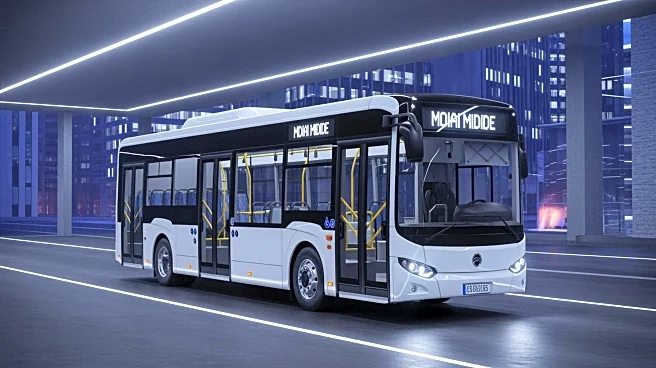What's Happening?
Solaris Bus & Coach, a Polish manufacturer, has introduced the Solaris Urbino 10.5 electric midibus at Busworld 2025 in Brussels. This new model is designed for high maneuverability in urban environments,
offering a compact yet spacious solution for city transport. The Urbino 10.5 has been recognized with the Sustainable Bus Award 2026 in the 'Urban' category, highlighting its commitment to zero-emission public transport. The bus features a modular drive system, which simplifies maintenance and reduces complexity for fleet operators. Additionally, Solaris showcased its Urbino 18 hydrogen and Urbino 12 electric models, both of which have received industry accolades for their innovative designs. The company is also focusing on expanding its presence in the North American market, citing recent contract awards in the United States and Canada.
Why It's Important?
The introduction of the Solaris Urbino 10.5 electric midibus is significant as it addresses key challenges faced by urban transit systems, such as energy efficiency and maintenance complexity. The advanced CO2 heat pump air conditioning system in the Urbino 10.5 reduces energy consumption for heating by over 50%, extending the operational range by up to 30%. This efficiency is crucial for transit authorities aiming to maximize daily operational uptime and reduce the number of vehicles needed. Solaris's focus on zero-emission vehicles aligns with global efforts to decarbonize public transport, particularly in Europe, where cities are aggressively pursuing climate commitments. The company's expansion into North America indicates a growing demand for sustainable transport solutions, potentially influencing public policy and investment in clean transportation infrastructure.
What's Next?
Solaris's ongoing international expansion, particularly in North America, suggests a strategic push to capture a larger share of the zero-emission bus market. As cities worldwide continue to prioritize sustainable transport solutions, Solaris's modular and efficient designs could become increasingly attractive to transit authorities. The company's success in Europe, where it ranks second in zero-emission bus deliveries, positions it well for further growth. Future developments may include additional product launches and partnerships aimed at enhancing the adoption of electric and hydrogen-powered buses. Stakeholders, including city planners and environmental advocates, will likely monitor Solaris's progress as a benchmark for sustainable urban transport solutions.
Beyond the Headlines
The deployment of the Solaris Urbino 10.5 electric midibus could have broader implications for urban planning and environmental policy. By offering a high capacity-to-size ratio, the midibus is particularly suited for congested city centers, potentially reducing traffic congestion and emissions. The modular design approach not only simplifies maintenance but also reduces long-term operational costs, making it an economically viable option for cities transitioning to green fleets. As more cities adopt such technologies, there could be a cultural shift towards prioritizing public transport over private vehicle use, contributing to reduced urban pollution and improved air quality.










